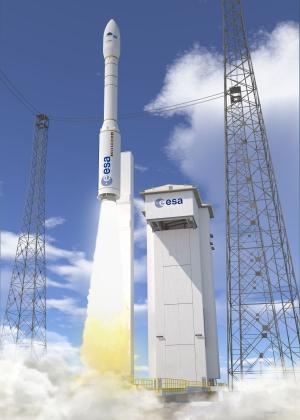Fri, Jan 20, 2012
ESA's Completes Final Checks On New Launcher
Final checkout of Europe’s new Vega launcher was
completed a week ago Friday, marking another milestone towards
its maiden flight from Europe’s Spaceport in Kourou, French
Guiana. The first Vega launch campaign began in November with the
installation of the P80 first stage on the launch pad. The two
solid-propellant second and third stages were added to the vehicle,
followed by the AVUM – Attitude & Vernier Upper Module
– liquid-propellant fourth stage. All four stages have
undergone final acceptance, including the testing of the avionics,
guidance, telemetry, propulsion, separation pyrotechnics and safety
systems.

These steps culminated on 13 January with Vega’s
‘synthesis control checks’, where all systems were put
into launch mode for the vehicle’s final acceptance. This
included pressurising the AVUM propulsion systems that actuate the
thruster valves. The rocket’s elements were switched on from
the control bench to simulate the launch countdown. The onboard
software then took over and simulated the different stages of a
flight. The interfaces between the vehicle and the control bench
were also tested. The test review confirmed that everything ran as
expected and that the launcher is ready for flight.
In the next phase of launch preparations, the ‘upper
composite’ – the fairing and payload – will be
integrated, followed by final checkout of the fully assembled
launcher and the countdown rehearsal. The first launch, VV01, is
targeted for 9 February. It will carry nine satellites into orbit:
the Italian space agency’s LARES and ALMASat-1, together with
seven CubeSats from European universities. This mission aims to
qualify the Vega launch system, including the vehicle, its launch
infrastructure and operations, from the launch campaign to payload
separation and disposal of the upper module.
Vega is designed to cope with a wide range of missions and
payload configurations in order to respond to different market
opportunities and provide great flexibility. In particular, it
offers configurations able to handle payloads ranging from a single
satellite up to one main satellite plus six microsatellites. Vega
is compatible with payload masses ranging from 300 kg to 2500 kg,
depending on the type and altitude of the orbit required by the
customers. The benchmark is for 1500 kg into a 700 km-altitude
polar orbit. (Image provided by ESA)
More News
LinxUs System Adds Capabilities for Data-Driven Operators Textron Aviation announced another option for operators processing their post-flight data, adding interoperability with GE>[...]
Aero Linx: The de Havilland Moth Club Ltd The de Havilland Moth Club evolved from a belief that an association of owners and operators of Moth aeroplanes should be formed to create>[...]
(Pilot) Inadvertently Applied Excessive Braking Action, And The Airplane Nosed Over Analysis: The pilot reported that, while landing at a remote, rough and uneven airstrip in a tai>[...]
“MCADT is committed to rapidly integrating armed first-person view drones into the FMF, enhancing small-unit lethality and providing organic capabilities that warfighters cur>[...]
From 2017 (YouTube Edition): Major Engine Supplier Joins Forces With Small Aircraft Manufacturer… GE recently made an agreement with Venom Aircraft to supply engines for the>[...]
 Citation Operators Get Another Flight Data Connection for QA
Citation Operators Get Another Flight Data Connection for QA ANN's Daily Aero-Linx (06.01.25)
ANN's Daily Aero-Linx (06.01.25) NTSB Final Report: Bellanca 8GCBC
NTSB Final Report: Bellanca 8GCBC Aero-News: Quote of the Day (06.01.25)
Aero-News: Quote of the Day (06.01.25) Classic Aero-TV: High-Speed Match-up - Venom and GE Rebirth A Legend
Classic Aero-TV: High-Speed Match-up - Venom and GE Rebirth A Legend



